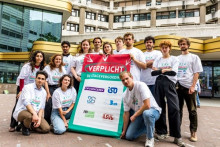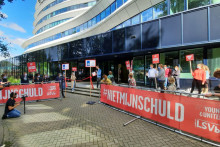They are organizing company visits, learning how to say ‘How are you’ in Mandarin, and packing their bags for a three-week tour of South Korea and China. The 26 bachelor students and 3 professors leave on 12 November as part of a larger research project focused on strategy for growth. Called the ‘Gloriental Study Tour,’ the group of UT students are studying Industrial Engineering & Management, Business Administration, Business Information Technology, and Industrial Design. The tour is part of their minor in International Exploration.
The first trip to China by UT students occurred in 1978. This time, the entire trip is organized by seven students, all members of Study Association Stress. Catherine Ann Lombard talked to three of the organizers: Daan van Leer, Chairman; Ellen Hamelers, Research Coordinator; and Marjon Pol who is working on Foreign Affairs which means spending hours on the phone arranging the visits to at least 20 companies.
Where will you be exactly?
EH:First we are flying to Seoul, then to Shanghai. From there we go to Chongqing and then finally home.
What are the aims of the research project?
MP:We are focusing on three frameworks: strategy, culture, and innovation and analysing the growth strategies and management styles in these areas.
What types of companies are you going to visit?
EH:We are focusing on multi-national and international companies in the fields of banking, renewable energy, automobiles, and electronics.
MP:We also plan to visit the Dutch embassies in every city.
DVL:We would also like to visit a plantation. A rice or tea plantation would be awesome.
How do you plan to conduct your visits?
EH:We hope to have an introduction of the company and then conduct our questionnaire. We then want to tour the company, because some things you simply can’t pick up from a questionnaire.
What do the companies have to gain by your visit?
DVL:It’s positive marketing for them and they will receive a copy of our preliminary research report. When we return, we will be compiling a final report which we will send to them digitally.
Marjon, you are dealing with Chinese speakers over the phone. Are you able to communicate effectively?
MP: One time I was speaking in English with a Chinese person who was replying in Chinese! It can take 10 minutes to write out one email address over the phone. They say ‘chi’ for both ‘c’ and ‘t,’ so you don’t always know what they mean.
How are you managing these challenges?
MP:The Chinese and South Koreans are really trying to be so helpful. They will search all over the factory for someone who speaks English. The best strategy is to be polite and say, ‘I’m sorry, but I didn’t understand.’ Be sure to stress that it is your problem, not theirs.
DVL:I have an application on my IPhone. All the Dutch phrases are there, and I can click and find the Chinese translation, both in writing and sound. For the trip, I even have ‘You are the most beautiful woman I have ever met.’ (laughing)
MP:I know how to say in Chinese, ‘Is there someone who speaks English? I can’t speak Chinese.’ That should help.
Catherine Ann Lombard

Photo caption:UT students are about to embark on the Gloriental Tour to S. Korean and China. The trip has been organized entirely by seven students, in the front row, from left to right: Ellen Hamelers, Joost Oosterbroek, Marjon Pol, Daan van Leer, Fons Mentink, Amber Dijcks, Jorik Quint.







